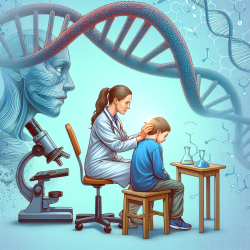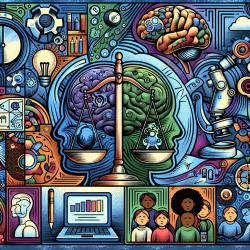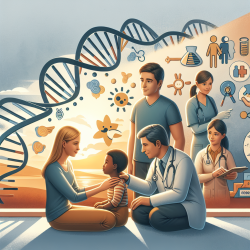Introduction
In the evolving field of speech-language pathology, data-driven decisions are critical to enhancing therapeutic outcomes, especially for children with neurodevelopmental disorders (NDDs). The recent research article, "GenIDA: an international participatory database to gain knowledge on health issues related to genetic forms of neurodevelopmental disorders," provides valuable insights that can be leveraged by practitioners to improve their skills and patient outcomes.
Understanding GenIDA
GenIDA is an international participatory database designed to better characterize the clinical manifestations and natural histories of rare genetic forms of NDDs. This database is unique because it involves the direct input of affected individuals and their families through structured questionnaires. As of July 2022, GenIDA has documented 1545 patient records from over 60 nationalities, providing a rich source of anonymized data for clinicians and researchers worldwide.
Key Findings and Implications for Practitioners
The GenIDA database offers several key findings that practitioners can implement to enhance their therapeutic approaches:
- Comprehensive Data Collection: The structured questionnaire covers a wide range of parameters, including physical, cognitive, and behavioral aspects, as well as neurological disorders. This comprehensive data collection allows practitioners to have a holistic view of the patient's condition.
- Longitudinal Studies: GenIDA facilitates longitudinal studies, enabling practitioners to monitor the progression of disorders over time. This is crucial for tailoring interventions that adapt to the evolving needs of the child.
- Parental Involvement: By involving parents in the data collection process, GenIDA ensures that the information is reflective of the child's daily life and challenges. Practitioners can use this data to engage parents more effectively in the therapeutic process.
Encouraging Further Research
While GenIDA provides a robust framework for understanding genetic NDDs, it also highlights the need for further research in several areas:
- Exploring Comorbidities: Many NDDs are associated with comorbid conditions such as epilepsy and autism. Further research is needed to understand these relationships and develop integrated treatment plans.
- Natural History of Disorders: Understanding the natural history of these disorders can lead to more effective interventions. Practitioners are encouraged to contribute to and utilize databases like GenIDA to track patient outcomes over time.
- Innovative Therapeutic Approaches: The data from GenIDA can inspire new therapeutic approaches that are more personalized and effective. Practitioners should remain open to integrating new research findings into their practice.
Conclusion
GenIDA represents a significant advancement in the field of genetic research related to neurodevelopmental disorders. By leveraging the insights from this database, practitioners can enhance their skills and improve outcomes for children with these complex conditions. The participatory nature of GenIDA ensures that the data is both comprehensive and reflective of real-world challenges, making it an invaluable resource for clinicians and researchers alike.
To read the original research paper, please follow this link: GenIDA: an international participatory database to gain knowledge on health issues related to genetic forms of neurodevelopmental disorders.










